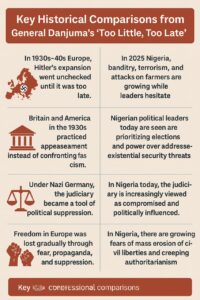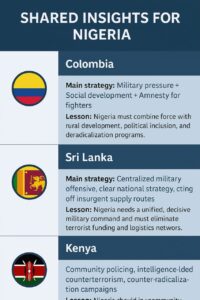T.Y. Danjuma’s Wake-Up Call: A Necessary Reflection, But A Shared Responsibility
By Princess G. Fraser. MFR. The National Patriots.
HeadlineNews.News
April 27, 2025
In one of the most searing critiques of Nigeria’s insecurity challenges, General Theophilus Yakubu Danjuma (rtd.) issued a stark warning titled “Too Little, Too Late.”
Drawing powerful parallels with the world’s tragic appeasement of tyranny in the 1930s, Danjuma warns that Nigeria risks losing its freedom and national identity if decisive action is not urgently taken.
While Danjuma’s concerns reflect painful truths, a balanced national reflection requires appreciating government efforts, acknowledging ongoing dangers, and calling for collective patriotic action.

General Danjuma’s Key Message
General Danjuma argues that:
Nigeria is drifting into a dangerous era of institutional capture, weak leadership, and rising terrorism.
Bandits and insurgents have expanded from forests to highways and could soon infiltrate towns and cities.
Judicial independence is at risk, with controversial judgments echoing a systemic decay.
Political elites are focused more on power games than confronting existential threats.
He warns:
“Appeasement of tyranny is submission to slavery. Delay in action costs lives and liberty.”

Historical Parallels Cited by Danjuma
In 1930s Europe, Hitler’s aggression grew unchecked while leaders appeased him.
In Nigeria today, terrorism and insecurity are expanding as leadership dithers.
Judiciary in Nazi Germany became politicized.
Similar fears surround Nigeria’s judiciary amid controversial rulings.
Freedom was lost gradually through fear, silence, and propaganda.
Nigeria faces growing suppression of dissent and shrinking civic space.
Recognizing Government Efforts
Despite ongoing insecurity, President Bola Ahmed Tinubu’s administration has made strategic efforts:
Operation Safe Homeland has neutralized dozens of terrorist leaders.
Amotekun and regional security outfits have been strengthened.
Record ₦3 trillion budget for security in 2025 reflects priority attention.
International counterterrorism partnerships with Turkey, UAE, and ECOWAS are yielding new intelligence capabilities.
ISWAP and Boko Haram operational bases have been significantly weakened in the Northeast.
Dr. Amiida Fraser, MFR, security governance consultant, notes:
“The Tinubu administration has dared to tread where angels feared — confronting security failings inherited over decades. However, terrorism evolves rapidly. Victory demands not just force, but strategic patience and collective resilience.”

Lessons from Colombia, Sri Lanka, and Kenya
Colombia
Crushed FARC insurgency through military pressure, rural development, and rebel reintegration.
Lesson: Military force must be combined with political and socio-economic solutions.
Sri Lanka
Defeated the Tamil Tigers (LTTE) through a centralized command, relentless offensive, and cutting off insurgent supplies.
Lesson: Decisive, coordinated action breaks insurgent momentum.
Kenya
Reduced al-Shabaab threats through community policing, local intelligence, and border security.
Lesson: Communities must be engaged in counterterrorism; not alienated.

The Danger of Complacency
International security expert, Dr. Pierre Musango, warns:
“Terrorism mutates like a virus. Early, aggressive containment is crucial. Once insurgents embed in urban centers, as seen in failed states, the cost of reclaiming territory multiplies.”
Danjuma’s fears of a creeping, hydra-headed crisis are legitimate.
Nigeria cannot afford to ignore rural banditry, judicial decay, or political polarization.
The Call for Collective National Action
Fighting insecurity cannot be left to soldiers and politicians alone:
Citizens must organize vigilance groups legally.
Religious leaders must reject sectarianism.
Traditional rulers must defend communal lands and values.
Civil society must expose radicalization tactics.
Media must resist sensationalism that spreads fear.
Mrs. Funmi Akintunde, civil society advocate, adds: “Security is not abstract. Every citizen has a role — from reporting suspicious activity to demanding governance reforms. Patriotism is participation, not just prayers.”
Conclusion: Awakening, Not Despair
General T.Y. Danjuma’s “Too Little, Too Late” is not a prophecy of doom.
It is a summons to courage, unity, and strategic resilience.
The government must expand military-civilian cooperation.
Citizens must rise beyond ethnic and partisan divides.
Nigeria must confront the monster before it mutates further.
Yet, it would have been even more patriotic for General T.Y. Danjuma, as a revered elder statesman and retired General, to proffer concrete solutions to the insecurity crisis and suggest practical roles he could personally play to assist the Federal Government and the Nigerian Armed Forces in tackling this hydra-headed monster.
In the absence of such voluntary commitment, President Bola Ahmed Tinubu could take proactive steps by setting up a Special Presidential Committee to design and oversee a National Security Intervention Program.
General T.Y. Danjuma could be appointed as Chairman or a Senior Member of this special intervention team to propose short, medium, and long-term strategies — combining his vast experience with national priorities to evolve realistic, result- oriented frameworks, including some suggestions from this article.
This would not only tap into his formidable experience but demonstrate genuine collaboration across generations to restore Nigeria’s security and future.
As history reminds us:
“The price of indifference is far greater than the cost of resistance.”
Nigeria still has a choice — to act boldly today or to lament bitterly tomorrow.

1. Colombia: Defeating the FARC Guerrilla Insurgency
Background:
Colombia battled the FARC (Revolutionary Armed Forces of Colombia) for over five decades — a leftist insurgent group that terrorized rural areas, kidnapped civilians, disrupted economic life, and profited from narcotics.
How Colombia Responded:
Military Modernization & Intelligence:
Colombia, with U.S. support via Plan Colombia, revamped its military and intelligence agencies. Special forces were trained to conduct targeted raids, rescue missions, and jungle warfare.
Civic-Military Coordination:
Government forces worked directly with communities, especially in rural zones, to gather intelligence and rebuild trust. This civic presence was key in isolating rebels.
Demobilization & Reintegration:
Former FARC fighters were offered amnesty, jobs, education, and housing in exchange for laying down arms. Over 15,000 rebels demobilized between 2006–2016.
Land Reform and Development:
By addressing rural poverty and inequality, the government reduced the pool of recruits available to FARC.
Final Peace Agreement (2016):
After years of negotiations, a peace deal was signed, ending the armed conflict. While not perfect, violence levels dropped significantly.
Key Lesson for Nigeria:
Terror cannot be defeated by force alone. Combine military pressure with reintegration, local development, and political solutions.
2. Sri Lanka: Crushing the LTTE Insurgency
Background:
The Liberation Tigers of Tamil Eelam (LTTE) fought a bloody 26-year separatist war, using suicide bombings, assassinations, and guerrilla warfare to demand a Tamil homeland.
How Sri Lanka Responded:
Unified Command Structure:
The Sri Lankan military centralized command under a clear national strategy, avoiding bureaucratic delays and inter-agency rivalry.
High-Tech Surveillance & Naval Blockade:
The military used radar, drones, and satellite intel to track LTTE movements. The navy cut off their sea supply routes, choking the group’s access to weapons and money.
Relentless Ground Offensive:
From 2006 to 2009, the military launched an all-out, decisive campaign, retaking territory from LTTE and dismantling their shadow government.
Winning the Narrative:
Despite international criticism for heavy-handed tactics, the government maintained popular support by controlling the national narrative and promoting national unity.
Key Lesson for Nigeria:
Decisive action requires unity of command, clear strategic planning, and cutting off financial and logistical lifelines to insurgents.
3. Kenya: Countering al-Shabaab Terrorism
Background:
Kenya faced sustained attacks from al-Shabaab, the Somali-based terrorist group responsible for attacks like the Westgate Mall (2013) and Garissa University (2015) massacres.
How Kenya Responded:
Operation Linda Boni:
A government-led counterterrorism operation to clear militants from forests and rural hideouts along the Somali border, involving army, police, and air force coordination.
Community Policing & De-radicalization:
Authorities empowered local elders, clerics, and youth groups in Muslim-majority areas like Mombasa to counter radical propaganda and report suspicious activity.
Border Security & Surveillance:
Kenya increased patrols, built a border wall with Somalia, and deployed tech-based monitoring.
Counter-Narrative Campaigns:
The government engaged civil society and media to counter al-Shabaab’s messaging and highlight the value of peace, tolerance, and inclusion.
Key Lesson for Nigeria:
Use community engagement, border control, and counter-radicalization narratives to tackle terrorism ideologically and logistically.

Shared Insights for Nigeria:
Colombia:
Main Strategy: Military pressure + Social development + Amnesty for fighters.
Lesson: Nigeria must combine force with rural development, political inclusion, and deradicalization programs.
Sri Lanka:
Main Strategy: Centralized military offensive, clear national strategy, cutting off insurgent supply routes.
Lesson: Nigeria needs a unified, decisive military command and must eliminate terrorist funding and logistics networks.
Kenya:
Main Strategy: Community policing, intelligence-led counterterrorism, counter-radicalization campaigns.
Lesson: Nigeria should invest in community partnerships, local intelligence gathering, and public messaging to defeat terrorist recruitment.
Dr. G. A. Fraser. MFR
The National Patriots.





